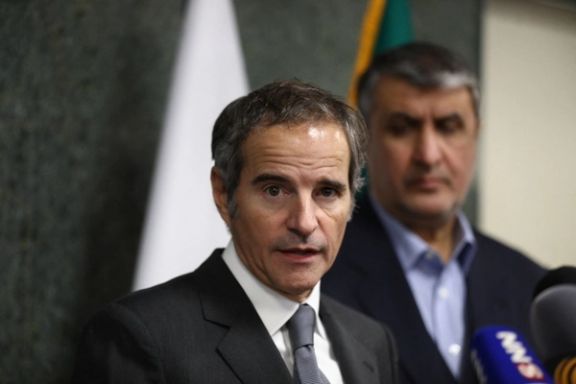‘We Need To Verify’: UN Nuclear Chief ‘Still Hopeful’ Over Iran Probe

The United Nations nuclear head said Friday his discussions with Tehran over its atomic program lacked “the momentum” needed to get “back to life.”

The United Nations nuclear head said Friday his discussions with Tehran over its atomic program lacked “the momentum” needed to get “back to life.”
Speaking to the government-sponsored Mediterranean Dialogues conference in Rome, Rafael Mariano Grossi, director-general of the International Atomic Energy Agency (IAEA), expressed concern at lack of progress in discussions over uranium traces found in ‘non-nuclear’ sites and at Tehran’s recent decision to enrich uranium to 60 percent at a second atomic facility.
The IAEA reported in early November that Iran had agreed to meet during the month to discuss the uranium traces, which the agency discovered in 2021, but the meetings have not taken place. Grossi signaled back in May that he found answers given by Iran unsatisfactory. In June and mid-November, the 35-state IAEA board of governors passed resolutions censoring Tehran. “We don’t seem to be seeing eye-to-eye with Iran over their obligations to the IAEA,” Grossi told the conference.
Tehran has argued that the discovery of uranium traces, which relate to work carried out before 2003, came only after allegations made by Israel in 2018. But Grossi has said that adequate explanations are required under Tehran’s basic ‘safeguards’ commitments under the Nuclear Non-Proliferation Treaty (NPT) particularly to establish what subsequently happened to the uranium.
Iran has also argued that IAEA questioning into the uranium traces should be shelved as part of reviving the 2015 Iran nuclear agreement, the JCPOA (Joint Comprehensive Plan of Action). Talks beginning early 2021 to restore the JCPOA, which the US left in 2018, reached stalemate in the summer.
Grossi said Friday he was “still hopeful” Tehran would satisfy the agency over the uranium traces. “We need to put our relationship back on track,” he argued.
The IAEA has charted in successive reports the expanding Iranian program, which began to exceed JCPOA limits in 2019, the year after the US left the JCPOA, which curbed Iran’s nuclear program in return for easing international sanctions.
‘Tripling capacity’
Grossi said that Iran’s recent announcement over enriching to 60 percent at Fordow, in addition to the 60-percent enrichment that began at the Natanz site in 2021, was “tripling, not doubling…their capacity to enrich uranium at 60 percent.” This brought Iran “very close to military level, which is 90 percent,” Grossi added, referring to the purity usually required for an atomic weapon. Under the JCPOA, Iran enriched only to 3.67 percent, and has also increased the efficiency and speed of enriching by using more advanced centrifuges that were barred under the 2015 agreement.
The IAEA director-general has also expressed consistent concern at Iran limiting agency monitoring to that required by the NPT. Tehran began reducing access in early 2021 in response to the killing of a scientist and attacks on sites, both widely attributed to Israel. “We need to go, we need to verify,” Grossi said Friday.